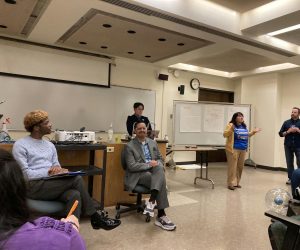Please Vaccinate Your Children
March 21, 2019
There’s a cell phone game called Plague Inc. that both fascinated and horrified me. In this game, you are a disease of your design and your goal is to kill all 8 billion people on Earth. On easy mode, (no one washes their hands, research doctors don’t work, and sick people are given hugs) I’ve annihilated the human race in less than two years. Even though the entire world doesn’t follow easy mode conditions, simply watching the rising numbers of infected people and deaths sent chills down my spine. The game also realistically portrayed today’s globalization well, letting me watch as a sick person boarded a plane or boat to spread the disease.
There are vaccines for 26 diseases available in the U.S., including the very contagious measles. The symptoms of measles are similar to a supremely intense flu that lasts two weeks. It can also lead to secondary diseases such as ear infections that can lead to permanent hearing loss, pneumonia, and encephalitis which is swelling of the brain. In 2000, due to the very high rate of measle vaccination, measles was declared eliminated in the U.S., yet according to the Centers for Disease Control and Protection (CDC), 159 individual cases of the measles have been confirmed in 10 states from Jan. 1 to Feb. 21 this year alone.
For public health concerns, states require children to have proof of vaccination to enter school. Exemptions include medical reasons such as allergies, weak immune systems, religious, philosophical, or personal beliefs. Although most states have gotten rid of the exemptions for philosophical and personal beliefs, some parents believe that the diseases that we vaccinate against don’t exist in the U.S anymore, vaccines are unsafe, or that vaccines don’t work.
Although measles, whooping cough, polio and other childhood diseases are not prevalent in the U.S, they occur in other countries. It is very easy for a traveller to bring the disease here and for an unvaccinated child to get sick. This is already occurring, as in the case of the reintroduction of measles to Costa Rica after an unvaccinated child and his parents vacationed there this past February. Costa Rica’s health ministry reported that the last time a Costa Rican citizen caught measles was in 2006 and the last case of imported measles was in 2014. Due to the new worldwide “vaccine hesitancy” trend, measles is now back in action there after five years.
Here’s another reason the CDC gives to vaccinate your children: by vaccinating your children, not only are you protecting your kids, but people with cancer who cannot get certain vaccines, other children who can’t get vaccines due to medical reasons, and babies too young to be vaccinated. To those who are vulnerable to disease, vaccinated people act as a shield that keeps disease away. By protecting yourself and your children, you also protect your neighbors and community from any outbreaks of contagious, deadly diseases such as measles.
Vaccines are very safe. In fact, according to the CDC website, the U.S currently has the safest vaccines supply in its history. Vaccines undergo strenuous testing that can last as long as a decade. The pros of being vaccinated against serious diseases outway the minor side effects. Although the news and social media play up one in a million bad side effects, that’s just what they are: a one in a million chance of something going wrong. On the CDC vaccine safety website, it says vaccines and their ingredients do not cause autism. The nine research studies completed since 2003 collaborate this statement. Vaccines train children’s bodies to resist and kill off the germs easier and faster than those whose bodies are encountering the disease for the first time. Think of it as training your body for a mini-marathon. The vaccine helps children not contract and gets rid of diseases.
Parents who object to vaccines due to religious reasons usually do so because of how vaccines are made. Islamic tradition forbids having pork in your diet however, gelatin made from pigs are an ingredient of some vaccines. Technically, you aren’t eating pig but injecting medicine with highly processed pig parts. But how did the choice to vaccinate get linked to the freedom to express your religion? Most religions were established before vaccines existed, so there can’t be a rule saying don’t vaccinate. It comes from how people interpret and express their religiosity.
You are allowed to exercise and express your religion in your own way. However, my argument is that not getting vaccinated does not have to be considered religious. You can take the religious meaning of vaccines away and view them in a scientific way. Scientific knowledge and religious knowledge are only two of many different kinds of knowledge. There’s scientific, moral, religious, emotional and more. While equal, each have their own strengths and weaknesses. Each can be more or less useful in different situations. “Street smarts” are very useful when wandering around a city while “book smarts” are useful at school. Just as some recipes require more sugar than salt or more salt than sugar, you can view vaccines through a lens of, let’s say, 75% scientific knowledge and 25% moral and religious knowledge.
Diseases such as measles and polio are scary and if there was a way to help prevent catching them, I would take it for me and my family. Here’s to raising the vaccination rate so that we don’t get wiped out in a Plague Inc. like scenario.







